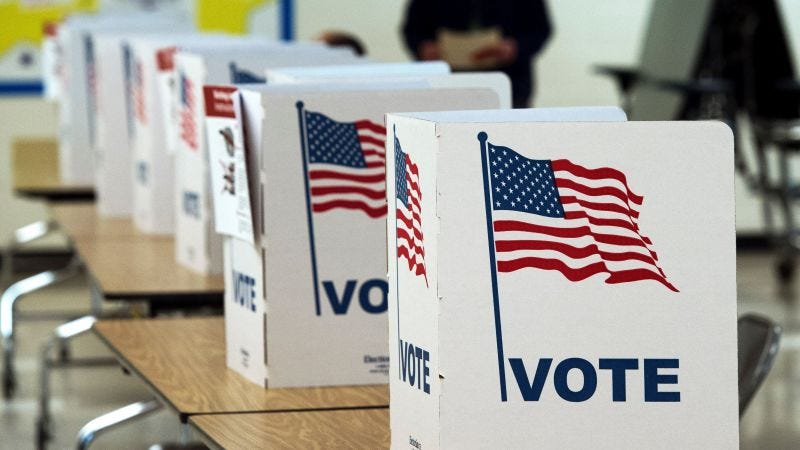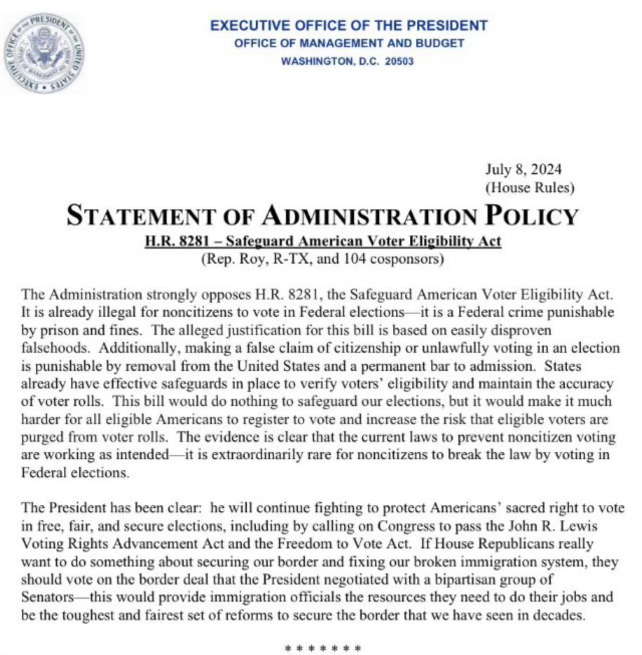This article was initially written last summer, when the Biden administration was still in office. As this topic is once again in the news cycle, I thought I would re-publish it and amend it with some additional information you might find helpful. Many of you are contacting me and telling me that you are hearing from friends and family who are enraged and saying, “This will mean married women can’t vote!”
Let’s go over what the SAVE Act is and then answer some questions
Estimates show that there are upwards of 20 million potential noncitizen voters in our country right now, thanks to President Biden’s abysmal border policies and enforcement. I hear from people daily about how the broken immigration system is burdening their families and communities. Setting aside the concerns about increasing violence hitting our soil, there’s a prominent alarm bell that should be ringing in the ears of all American citizens, and that’s the pressing issue of noncitizen voting.
This Wednesday, July 10th, 2024 at 11:00 am ET, the House of Representatives has the opportunity to vote on the floor on the SAVE Act, which, if passed through Congress, can safeguard the integrity of our national (and state/local) elections. This sounds like it should be a bipartisan bill (so many do, don’t they?!), but you and I both know it’s not that simple. What the SAVE Act is proposing is basic and built on the fundamental principle that ONLY citizens can vote.
Let’s get into it. What is the SAVE Act all about?
The SAVE Act (HR8281), or Safeguard American Voter Eligibility Act, was introduced in the 118th Congress in May 2024 by Senator Mike Lee and Congressman Chip Roy. The primary aim of the legislation is to amend the National Voter Registration Act of 1993 to require proof of U.S. citizenship for voter registration in federal elections. The act stipulates acceptable forms of proof, including a valid U.S. passport, a REAL ID-compliant identification, a U.S. military ID with a record of service, or a government-issued photo ID accompanied by a certified birth certificate or other specified documents. According to the National Conference of State Legislatures, only 36 of our states require some I.D. to vote… HOWEVER….In 2013, the U.S. Supreme Court ruled in an Arizona case that states must permit people to register for federal elections using a federal form that does not require documentary proof of citizenship. Crazy, right?!
The SAVE Act also mandates that states establish processes to remove non-citizens from voter rolls and imposes increased federal penalties for individuals who register non-citizens to vote in federal elections. This measure is intended to prevent illegal voting by non-citizens and to ensure the integrity of U.S. elections, addressing concerns about potential foreign interference and maintaining public trust in the electoral system.
Supporters of the bill, such as Senator John Kennedy (and numerous other Republicans), emphasize the importance of protecting the sanctity of U.S. citizenship and ensuring that only citizens participate in federal elections. They rightfully argue that the increase in illegal immigrants in the U.S. necessitates stricter controls to prevent non-citizens from influencing election outcomes. Basic stuff, right?!
Who supports it? Who doesn't?
There are plenty of people in Congress (and the general public) who want laws passed that require voters to produce their State ID or passport in order to register to vote. According to a recent Pew Research Poll, 81% of Americans want ID verification to vote. You’d be hard-pressed to find a member of the GOP who disagrees with the SAVE Act and thinks it’s important legislation. It’s very simple.
That being said, President Biden and Democrats do not support this bill, and the Executive Office released the following statement this afternoon, condemning it.
Why is this bill vital if it’s already illegal to vote if you aren’t a citizen?
It’s crucial because something being “illegal” doesn’t prevent it from happening in all (or even most) situations. We are watching that reality play out on our southern border, right?
President Biden is afraid of allowing this bill to be implemented because he fears (rightfully) that if I.D. is required and noncitizens can’t produce it, they won’t risk the charge of a federal prison sentence or deportation, providing less predictability to his voter count. In some states right now, you can vote by simply swearing or affirming you are a citizen - that’s much less risky and easier than obtaining a fake I.D. if it becomes required. (Am I the only one that thinks it’s nuts that we don’t nationally require I.D. to vote?!!?)
President Biden and Democrats know this, and they will press for the SAVE Act to be squashed, labeling it as xenophobic and racist. The headlines will be plentiful.
Does the SAVE Act mean women will be disenfranchised from voting?!
No, it does not.
First, the SAVE Act includes provisions to address name discrepancies. It mandates states to create processes for voters whose proof-of-citizenship documents don’t match their current legal name due to marriage or other changes. For example, states like Arizona already handle this by allowing supplementary documents, such as marriage certificates, to resolve mismatches. The Act’s framework ensures women who’ve changed their names can still register without being blocked, provided states implement these processes effectively.
See bill wording:
Second, most women have access to acceptable identification. Over half of Americans, including women, have passports, and many more have birth certificates. For those without, the Act allows alternative documentation, like naturalization papers or certain state IDs indicating citizenship. The idea that millions of women would be unable to vote ignores the prevalence of these documents and the flexibility built into the legislation.
Third, the Act’s goal is to protect election integrity, a priority for many conservatives. Noncitizen voting, while rare, undermines trust in the system. The SAVE Act strengthens verification without targeting any group, including women. Claims of disenfranchisement obviously come from opponents exaggerating impacts to stir fear, but the bill’s design focuses on fairness, ensuring only eligible voters participate, regardless of gender.
Finally, practical implementation would likely smooth out concerns. States already manage voter registration with varying ID requirements, and election officials are incentivized to help eligible voters, not obstruct them. Horror stories about women being turned away en masse don’t align with how states have handled similar rules, like Arizona’s citizenship checks, where workarounds exist for name changes.
My opinion on all the people saying this is a grab from Republicans to kill the vote for women: They are gaslighting and fear-mongering. Do they truly believe women are incapable of managing documents that identify them? It’s pandering. Women are capable of changing their names - people have been doing this for decades. To continue saying this will make voting impossible is an insult to women.
Where does the SAVE Act stand now?
The SAVE Act passed the House of Representatives on April 10, 2025, with a vote of 220-208, supported by all present Republicans and four Democrats. It’s now in the Senate, where a companion bill, S. 128, has been introduced by Senator Mike Lee. The Senate version faces significant hurdles, likely needing 60 votes to overcome a Democratic filibuster, which seems unlikely given current sentiment and only 20 Republican co-sponsors. Unless attached to other legislation, Democratic support, or a procedural workaround, it’s effectively stalled.
I still encourage everyone reading this to head HERE and take a few moments to reach out to your senators and representatives and tell them how you feel about it.
It’s important.









While I generally agree with the SAVE act, I do question how “easy” it is to prove citizenship. My parents are naturalized US citizens but have chosen not to renew their passports because they don’t want to travel “far” (if at all) in their “old age”. I know they have their citizenship certificates “somewhere” but not exactly handy. So, in their case, while not impossible to prove citizenship, it isn’t easy and/or potentially “not worth the effort” to do so, in order to vote (at least according to them).